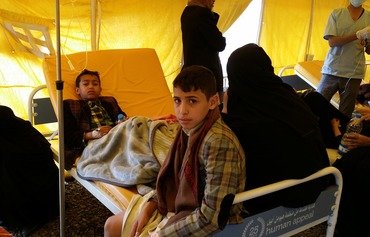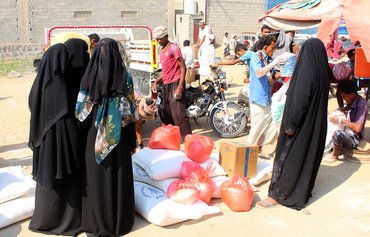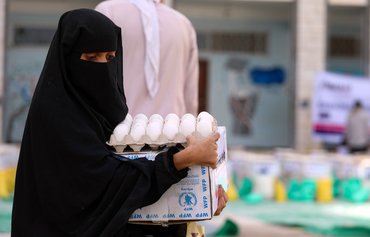Human rights activists in Yemen condemned the actions taken by the Iran-backed Houthis (Ansarallah) to prevent humanitarian organisations from operating in areas under the militia's control.
They also denounced the Houthis' tampering and looting of aid, saying these actions compound the Yemeni people's suffering at a time when 85% of the population live in poverty.
On January 21st, the Houthi Ministry of Public Health and Population issued a circular banning 36 international, Arab and local relief organisations from operating in areas controlled by the militia and prohibiting them from providing services to citizens.
The Houthi militia addressed the circular to all health offices in districts and provinces under its control, calling on them to ban the movement of international relief organisations listed in the circular.
The directive, signed by Houthi Deputy Minister of Health Abdul Aziz al-Dulaimi, called on all health offices to prevent these organisations from operating until they are licensed by the Houthi-controlled ministry.
Activists say this is just a cover to allow the Houthis to loot relief aid to finance their war effort.
Deteriorating health sector
"For matters to reach the point of prohibiting the entry of medical aid to those in need, particularly given the deteriorating health situation in the country, means we are living in an era of moral collapse," Dalia Hizam, a pharmacist, told Al-Mashareq.
"The impact will be negative for citizens, particularly in light of the deterioration of the health sector," she said, citing recent reports by the World Health Organisation (WHO) indicating that the health situation in Yemen is on the brink of collapse.
By preventing humanitarian organisations from doing their job, "this Iran-backed group confirms to us that it does not believe in any humanitarian or civil work", said lawyer and human rights activist Abdul Rahman Barman.
The Houthis are "an armed group fighting humanitarian efforts to save Yemenis who are facing famine, poverty and disease", he told Al-Mashareq.
They are driven by their desire to seize power by force of arms in the areas under their control, he added.
Barman called on the international community "to respond with a clear stance to these practices and violations against humanitarian work".
Aid crucial for Yemenis
"The irony of these events is that this militia, which is taking the country back to the stone ages, claims to have its own standards that [humanitarian] organisation must meet," said Mousa Namrani, media official for The National Organisation for Defending Rights and Freedoms (HOOD).
Aid organisations are helping Yemenis overcome the health disaster they are facing due to the spread of epidemics and lack of a healthcare infrastructure in the country, he said.
These organisations provide about 80% of the medical services Yemenis need, he told Al-Mashareq.
"Over the past few years, we have witnessed several incidents of looting of international organisations warehouses in areas controlled by the militia," he said.
Similarly, aid was prevented from reaching besieged areas of Taiz, he said, adding that Houthis also have abducted international aid workers, fired at them and terrorised them.
Looting of funds
In late January, internal disputes among Houthi leaders escalated over the alleged embezzlement of $14 million worth of assistance provided by the UN for de-mining operations in Yemen, local media reported.
Media reports said the Houthis have levelled corruption charges against one of their leaders, De-mining Centre director Yahya Hassan al-Houthi, and ordered his arrest at his office in Sanaa.
The accusations "are a pretext used by some militia leaders to loot those funds", according to the media reports.
"Ever since humanitarian aid has started arriving in Yemen, everyone is aware that the Houthis have been looting anything they can get their hands on," researcher Waddah al-Jalil told Al-Mashareq.
They divert the aid to their supporters or sell it on the black market to finance their war effort, he said.
"The availability of food aid provided by international organisations on the black market in large quantities shows the extent of the Houthis’ looting of this aid," said Mohammed al-Haimi, an accountant who works for a private company in Sanaa.
He said he is shocked by the "audacity" of selling aid bearing the emblems of relief organisations in commercial quantities.
All of this is happening "while citizens suffer from famine, poverty, destitution and other devastating circumstances of the war", he told Al-Mashareq.
2,000 food aid baskets looted
Yemeni Minister of Local Administration and chairman of the Higher Committee for Relief Abdul Raqeeb Saif Fateh condemned the continued seizure and looting of relief and humanitarian aid by the Houthi militia.
These practices violate all international and humanitarian laws, he said on February 9th.
Some 2,000 food aid baskets were found this month at a farm owned by Houthi supporter Abdullah Hamoud Talib al-Ahdal in al-Hodeidah's al-Hays district, local media reported.
This represents "irrefutable proof of the militia’s continued starvation of the Yemeni people", Fateh said.
He called on the UN Office for the Co-ordination of Humanitarian Affairs in Yemen to conduct an urgent and comprehensive investigation into the looted aid.
"Silence about this issue is unacceptable, especially that the aid bears the logos of UN organisations," he said.
Fateh urged international relief and humanitarian organisations to inventory all aid and ensure it safely reaches all deserving beneficiaries.
"As long as the ports remain in the hands of the [Houthi] militia, they will be a real threat and will be exploited for inhumane purposes," Fateh said.

![Workers unload wheat assistance provided by UNICEF from a cargo ship at the Red Sea port of al-Hodeida on January 27th. The Houthis (Ansarallah) have been accused of looting aid intended for impoverished Yemenis in areas under their control. [Abdo Hyder/AFP]](/cnmi_am/images/2018/02/19/11501-yemen-unicef-aid-600_384.jpg)






